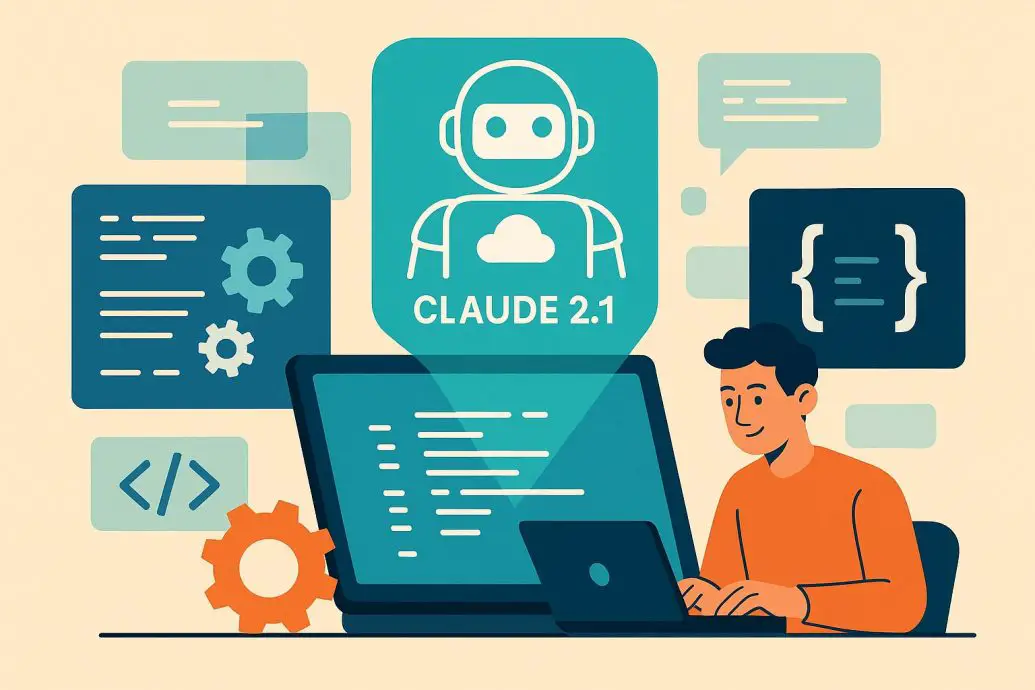Anthropic Launches Claude 2.1, Dev Tools
The announcement that Anthropic launches Claude 2.1, Dev Tools has marked a major step forward in the generative AI landscape. At its first developer conference, Anthropic introduced innovations to its Claude AI platform. These updates include a 200,000-token context window, improved analytical capabilities, and new developer tools and APIs. These advancements position Claude 2.1 as a strong competitor to OpenAI’s GPT-4 and Google’s Gemini. Anthropic continues to focus on safety and scalability to meet the demands of developers and business users.
Key Takeaways
- Claude 2.1 includes a 200K-token context window, better reasoning, and reduced hallucinations.
- New developer tools feature the Claude API Console and an enterprise suite for integration and workflow management.
- The model uses a Constitutional AI framework to ensure alignment, reliability, and safety.
- Claude 2.1 competes with models like ChatGPT Enterprise and Google Gemini in capabilities and enterprise applications.
Also Read: Unlocking Blockchain’s Future with This Token
Table of contents
Claude 2.1: Key Upgrades Delivered
Claude 2.1 is Anthropic’s most capable AI model so far. It blends strong contextual understanding with an architecture built for safety and enterprise use. One highlight is the extended 200,000-token context window. This allows the model to handle and analyze content that spans hundreds of pages. Use cases include reviewing long legal documents, running multi-source research, or conducting financial audits in a single prompt.
Claude 2.1 has shown lower hallucination rates compared to Claude 2.0. Independent evaluations estimate the reduction to be nearly twofold. Improvements come from better model calibration, cleaner data inputs, and the Constitutional AI framework, which guides behavior using feedback-based principles and structured values.
Performance Comparison
| Model | Context Window | Hallucination Rate (Est.) | Alignment Method | Enterprise Tooling |
|---|---|---|---|---|
| Claude 2.1 | 200K tokens | Low | Constitutional AI | Console, APIs, Enterprise Suite |
| ChatGPT Enterprise (GPT-4) | 32K tokens | Medium | Reinforcement Learning from Feedback | ChatGPT Business Features |
| Google Gemini | Up to 32K tokens (rumored) | Medium | Ethical AI Lab Oversight | Vertex AI Tools |
Anthropic’s New Developer Toolset
Alongside Claude 2.1, Anthropic released its Claude API Console. This browser-based interface helps developers test prompts, monitor performance, and deploy models with high control. The interface shows real-time token usage, latency data, and deployment options. This reduces onboarding challenges and supports more advanced development workflows.
Anthropic has also launched SDKs for Python and TypeScript. These tools help integrate Claude with backend systems, web applications, and data platforms. Developers can configure models for completion or chat-based responses. This makes Claude flexible for use cases such as customer support bots or internal reporting tools.
Developer Use Cases
- Ingesting internal knowledge bases to anchor responses in real company context
- Handling large legal contracts or case files in litigation workflows
- Analyzing source code to annotate or suggest improvements in legacy systems
- Building assistants that understand and navigate full research archives
Also Read: Anthropic Seeks $2 Billion Funding Boost
Commitment to AI Safety and Constitutional Alignment
Anthropic CEO Dario Amodei emphasized that safety is a key focus for the company. Unlike models that rely only on human-labeled training data, Claude 2.1 uses a different method called Constitutional AI. This approach uses a set of principles, similar to a constitution, to guide Claude’s behavior in complex or sensitive situations.
The aim is to produce responses that are not only intelligent but also ethical. This alignment system reduces risk when using Claude in areas where decisions may have legal or social implications.
Also Read: Amazon and Anthropic Collaborate on AI Supercomputer
Industry Comparison and Market Positioning
OpenAI’s GPT-4 has gained traction in both business and consumer applications. Still, it has a smaller context window than Claude 2.1. The ability to manage up to 200K tokens gives Claude a major advantage in cases that need memory of extended documents. This benefits users dealing with financial history, product papers, or collaborative data records.
Claude 2.1 also appears to hallucinate less than GPT-4, especially in structured tasks such as reasoning and analysis. Public benchmark studies have not fully confirmed these results. Google’s Gemini may offer faster response times through TPU hardware and deep links to the Google Cloud ecosystem. Despite that, Claude is setting a new bar for generative output scale.
Developer and Industry Reactions
Developers on X and discussion forums like Hacker News have reacted with enthusiasm to Claude’s extended context window. Many praised the smooth experience of the API console. One senior developer from a legaltech firm said, “With 200K tokens, Claude digested and summarized a 500-page NDA batch in a single session. That saved us weeks.” An AI researcher from Berkeley said that Constitutional AI could set a new safety standard if it proves reliable in tests.
Industry experts observe that Anthropic is shifting from a research-focused player to one ready for wide adoption. Claude 2.1 combines strong technical features with usability, which makes it attractive to companies across fields like law, healthcare, public services, and tech development.
Also Read: What is Tokenization in NLP?
The Road Ahead
Anthropic has made a clear statement with its first developer event. Claude 2.1 is no longer just a research asset. It is now a structured platform meant for enterprise-level use. With mature tooling and transparent design choices around safety, Claude may become a preferred choice for companies evaluating generative AI options.
The model’s success will depend on continuing to share data, publishing benchmarks, and offering measurable value to real users. With a focus on long-term expansion and developer-first experiences, Anthropic may become one of the most important names in enterprise AI.
